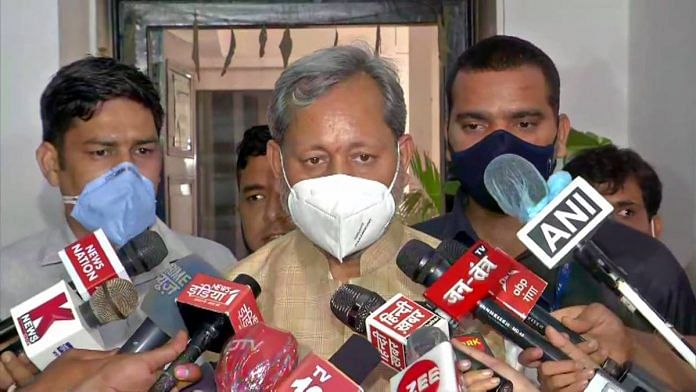New Delhi: Citing “constitutional crisis”, Uttarakhand Chief Minister Tirath Singh Rawat submitted his resignation to Governor Baby Rani Maurya late Friday night.
He took over as chief minister on 10 March, replacing Trivendra Singh Rawat. According to Article 164 of the Constitution and Section 151A of the Representation of the People Act 1951, he had six months — till 10 September — to become a member of the Uttarakhand Assembly in order to continue in the post.
With the Uttarakhand Assembly term ending in less than a year, in March 2022, it has complicated the constitutional crisis in the state, leading to conjectures on whether the Election Commission (EC) can hold bypolls in such a situation.
According to experts and courts, the Election Commission is not mandated to hold the by-elections within six months in such situations but may still choose to do so. However, courts have in the past set aside such decisions by the poll body, citing the short term that this leaves incoming candidates with.
Also read: Congress claims ‘crisis’ in Uttarakhand over Rawat’s CM post, but here’s why BJP can avert it
What the law says
Article 164(4) of the Constitution allows a non-legislator to occupy a post in the council of ministers, including the office of the chief minister, only for six months. If he doesn’t get elected within this period, the Constitution says he “ceases to be a minister”.
Section 151A of the Representation of the People Act 1951 reiterates this position, saying that a “a bye-election for filling any vacancy…shall be held within a period of six months from the date of the occurrence of the vacancy”. However, the proviso to this section says that this mandate won’t apply “if the remainder of the term of a member in relation to a vacancy is less than one year”.
There are two vacant assembly seats in Uttarakhand — Gangotri and Haldwani. The Uttarakhand Assembly term ends in March 2022, leaving general elections in the state less than a year away. This makes the exception to Section 151A applicable to this situation, leaving it up to the EC to take a call.
EC can still hold elections
Former Lok Sabha secretary general and Constitutional expert P.D.T. Achary said that in such a situation, when the remainder of the member’s term is less than a year, the elections “need not be held”.
“There is a mandatory provision saying that within six months, elections shall be held. The proviso says that this shall not apply if the remainder of the term is less than one year.”
“What this means is that the Election Commission can hold it or it may not hold it. It is just not mandatory to hold the elections (bypolls) if less than one year is left. So that is the simple position, that is it is not mandatory, whereas in general cases, it is mandatory to be held within six months,” he added.
Former Lok Sabha secretary general and Constitutional expert Subhash C. Kashyap also holds a similar view. “Well of course, it is at the discretion of the Election Commission, but then the EC has to consult the government in regard to the availability of personnel etc,” he added.
He said that while there is no rule requiring a special request to be made to hold such elections, “consultation between the government and the Election Commission is a practical requirement”.
Kashyap, however, added that “normally, if the general elections are expected in the near future, then there is no point holding by elections for a particular seat”.
What courts say
In a 2019 judgment, the Bombay High Court had also accepted the position that the application of the exception under Section 151A makes the power of the ECI to hold such elections to fill a vacancy as “discretionary”. In other words, it is not mandatory for the bypolls to be held for filling a casual vacancy within six months if the exception under Section 151A applies.
During the hearing, the EC itself had accepted the position that there is no prohibition on it to hold the election in a case where the vacancy is available for less than a year.
“The ECI contends that in order to fulfill its constitutional obligations and its commitment to the democratic governance of the country…it has held bye-election in appropriate cases, even when the vacancy was available for less than a year, or even less than six months,” the order had noted.
However, in this case, the poll body had held the election after expiry of six months, leading to the term of the incoming member lasting for about five months. The court then set aside the EC’s decision to fill a casual vacancy for a period of about five months as “arbitrary, discriminatory and not reasonable”.
(Edited by Manasa Mohan)
Also read: When Tirath Singh Rawat made the US colonisers of India & ripped jeans trend



